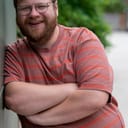Stay in the Loop
BSR publishes on a weekly schedule, with an email newsletter every Wednesday and Thursday morning. There’s no paywall, and subscribing is always free.
Imagining life for Jews after a successful insurrection
InterAct Theatre Company presents Deborah Zoe Laufer’s The Last Yiddish Speaker

There is a refrain often repeated by my Jewish mother, encapsulating the essence of our holidays: “They tried to kill us, they didn’t, let’s eat.” Existential terror has been a constant in the history of Judaism, spanning both ancient and modern times. In Deborah Zoe Laufer’s new play, The Last Yiddish Speaker, receiving a rolling world premiere at InterAct Theatre Company, this history is personified by a 1,000-year-old Yiddish-speaking Bubbe named Chava. This character, funny and pragmatic, offers a striking glimpse into the specificity of Jewish generational trauma.
Unfortunately, these ideas are not able to fully develop in The Last Yiddish Speaker. The world of this play is an alternate near future in which the January 6 insurrection of 2021 successfully overturned the 2020 presidential election. What this serves to do, besides raise my blood pressure, is to offer up a fictional world open to debate. Rather than following characters through a story, I found myself constantly second-guessing the world of this alternate future being created.
Tension and confusion
In this dystopian projection, set in 2029, the United States has transformed into a hyper-conservative, patriarchal, white, Christian, nationalist ethno-state. Paul (Dan Hodge) and his daughter Sarah (Kaitlyn Zion), now using the name Mary, are living under new identities in a small New York town. There they must open their home, phones, and computers to frequent inspections by repressive agents of the state. Their inspector also happens to be Mary’s boyfriend, John (Gabriel Elmore). Amidst this tense situation, Aunt Chava (Stephanie Satie), a mysterious Jewish elder, arrives on their doorstep. Together, the family must decide how to navigate their identity and plan for their future.
Director Seth Rozin keeps the action moving. The ensemble members do their best to commit to a script that veers into the maudlin. In particular, Hodge delivers a nuanced performance as he wrestles with the dueling needs of safety and self-acceptance. Satie gives a surprisingly grounded performance as Chava. As written, Sarah is a puzzling character. She knows the grave stakes of being discovered yet is seemingly unable to keep her true feelings under the surface. Zion tries to thread the needle between these dimensions, but the character ultimately feels confused. This confusion strikes at the heart of The Last Yiddish Speaker: the play wants to serve as dramatic speculative/dystopian fiction while also using magical realism to explore Jewish identity. Ultimately, it achieves neither.
The possibility of solidarity
More problematically, its focus on the specificity of Jewish suffering in this particular narrative feels misguided. In the context of the story, Sarah and Paul have watched as immigrants, African Americans, liberals, and queer people have been exterminated. They are able to survive by suppressing their Jewishness and passing as white. The focus then on Judaism, in the midst of all that suffering, seems to ignore intersectional identities and the possibility of solidarity. As a queer Jewish person, I walk through the world with two identities. It felt disconcerting to have Jewishness seen as inherently tied to suffering, while violence against queer folks is handwaved away.
Colin McIlvaine’s set conveys the claustrophobia of this family’s situation and nails the small-town Christian aesthetic. The costumes by Katherine Fritz feel a bit dated, which is possibly a nod to the cyclical nature of fashion. She dresses Chava in layers of clothes that effectively symbolize her journey. Drew Billiau’s lights and Chris Colucci’s sound can veer into the cheesy as it tries to convey the play’s more magical elements.
What, When, Where
The Last Yiddish Speaker. By Deborah Zoe Laufer, directed by Seth Rozin. $15-$35. Through April 21, 2024, at the Proscenium Theatre at the Drake, 302 S Hicks Street, Philadelphia. (215) 568-8079 or interacttheatre.org.
Accessibility
The Drake is a wheelchair-accessible venue with gender-neutral restrooms. On Friday, April 12, at 7pm, there will be a Covid-19 safety performance of The Last Yiddish Speaker.
Sign up for our newsletter
All of the week's new articles, all in one place. Sign up for the free weekly BSR newsletters, and don't miss a conversation.

 Josh Herren
Josh Herren